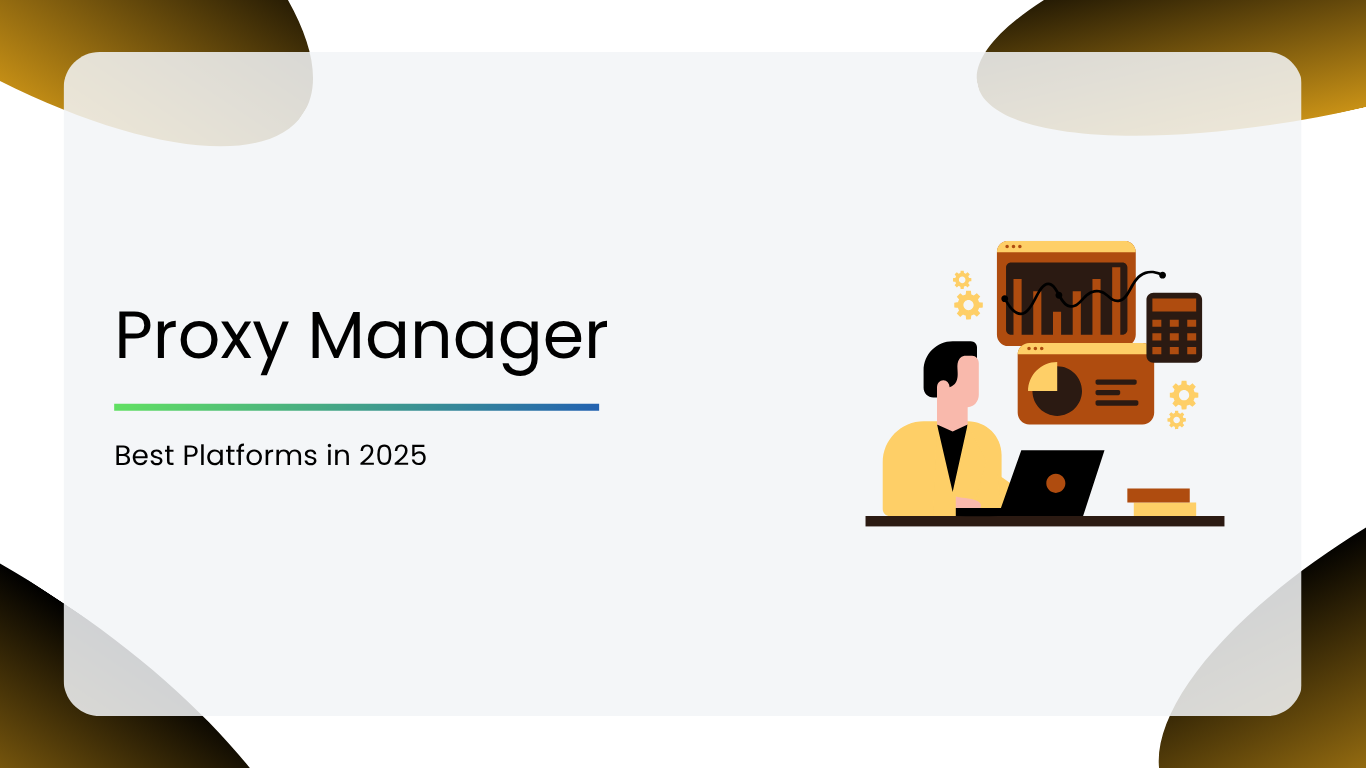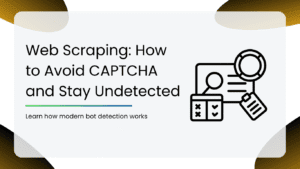In today’s digital world, maintaining privacy, bypassing geo-restrictions, and automating online tasks efficiently has become very crucial, whether you’re a business, developer, or just a casual user. This is where a proxy manager comes into the picture.
A proxy manager is a specialized tool that helps users control, rotate, and make use of multiple proxy servers effortlessly. While a proxy server is used to hide your IP, a proxy manager handles how these proxies are used, rotated, and assigned to tasks. This automates the entire process for scale, efficiency, and stealth.
In 2025, proxy managers have evolved with AI-driven IP rotation, real-time analytics, and enhanced security protocols. This makes them indispensable for:
- Web scraping & data extraction
- Ad verification & SEO monitoring
- Sneaker copping & e-commerce automation
- Bypassing geo-blocks for streaming or market research
With cyber threats and anti-bot systems becoming more sophisticated, a reliable proxy manager isn’t just a luxury anymore – it’s a necessity for smooth and secure online operations.
In this blog, we will discuss more about proxy managers and help you find the right one as per your requirements.
Why Use a Proxy Manager?
Using a proxy manager offers a lot of advantages over manually handling proxies. Here’s why businesses and individuals rely on them in 2025:
- Enhanced Privacy & Security: Proxy manager masks your real IP. This prevents hackers, trackers, and competitors from monitoring your online activity.
- Avoid IP Bans & CAPTCHAs: They automatically rotate proxies to prevent websites from blocking your requests. This reduces the risk of rate limiting and blacklisting.
- Improved Speed & Reliability: They distribute traffic across multiple proxies. This helps in reducing downtime and improving connection speeds. Some proxy managers even offer load balancing to optimise performance.
- Automation & Scalability: This is considered essential for large-scale data scraping, social media automation, and sneaker bots, as it saves time by managing thousands of proxies without any manual intervention.
How to Choose the Right Proxy Manager in 2025
Not all proxy managers are created equal. Here’s what you should consider before selecting one:
- Performance & Speed: Always look for low latency, high uptime (99%+), and unlimited bandwidth options. AI-driven proxy rotation helps avoid detection in 2025’s stricter anti-bot environments.
- Security & Anonymity Features:
Features such as IP whitelisting, user-agent rotation, and CAPTCHA-solving integration improve success rates. Try to avoid providers that log your data and opt for no-logs policies.
- Ease of use & integration: Look for proxies that have a user-friendly dashboard with automation features such as API access and browser extensions. And also something that supports Python, Node.js, or other dev tools if you’re a programmer.
- Pricing & Scalability: Compare between proxies that let you pay-as-you-go and subscription models, and choose based on usage. Go for enterprise plans for large-scale operations and budget options for startups.
Table of Contents
Best Proxy Managers
1. Bright Data
Bright Data stands as the industry leader in proxy services, that is maintaining its position through continuous innovation and an unparalleled proxy network. Founded in 2014, the company has consistently pushed the boundaries of what is possible in web data collection and proxy management.
Bright Data’s Proxy Manager Tool integrates directly with its proxy pool and provides users with advanced session control, rule-based routing, and browser integrations. This makes it a top-tier proxy orchestration platform.
Key Features
- AI-Powered Proxy Rotation: Their machine learning algorithms automatically select the optimal IP for each request, considering factors like success rate, speed, and geographic location.
- Granular Targeting: Users can target specific cities, ASNs, mobile carriers, or even individual ZIP codes, which is crucial for accurate local market research.
- Compliance Centre: It has a comprehensive suite of tools to ensure GDPR and other regulatory compliance, which includes automatic opt-out request handling as well.
- Advanced Success Metrics: It also has real-time dashboards that provide detailed insights into success rates, block rates, and performance metrics.
- Browser Extension: The Bright Data proxy manager extension for Chrome and Firefox allows users to easily configure and manage.
- Multi-Country Proxy Management: It enables users to use IPs from various countries without the need for separate proxy ports.
Pros
- Unmatched Reliability: With a 99.99% uptime SLA, Bright Data is considered the most dependable solution for mission-critical operations.
- Ethical Sourcing: All residential proxies are obtained through transparent, consent-based methods.
- Enterprise-Grade Support: Bright Data offers dedicated account managers and 24/7 technical support.
- Flexible Integration: Robust APIs and SDKs for all major programming languages.
Cons
- Premium Pricing: Bright Data might be expensive for small businesses or individual users.
- Complex Setup: The number of features it offers comes with a steep learning curve that may overwhelm beginners.
Review
Bright Data has always delivered the highest success rates for complex scraping tasks. The platform particularly excels in various proxies and comes with a lot of features. The only con is that the platform might not be very user-friendly for beginners.
2. Oxylabs
Oxylabs has made its name as the go-to solution for professional web scraping needs. Founded in 2015, the company has focused relentlessly on building the most effective proxy infrastructure for data collection.
Today, in 2025, Oxylabs stands out as one of the best proxies available for its specialized scraping tools and exceptional success rates. Their network of over 175 million residential IPs, combined with advanced machine learning algorithms, makes them particularly effective against even the strongest anti-bot systems.
Key Features
- Next-Gen Scraping API: It handles JavaScript rendering, CAPTCHAs, and Proxy rotation automatically.
- Real-Time Dashboard: It also provides instant visibility into scraping performance and success rates.
- Customizable Retry Logic: The platform automatically retries failed requests with different parameters.
- Data Extraction Tools: It also has built-in parsers for common data formats and structures.
Pros
- Industry-Lending Success Rates: It has consistently achieved 99.9% success rates on difficult targets.
- Specialised Scraping Tools: It offers features like automatic IP cooldown, which significantly improves results.
- Excellent Documentation: It has comprehensive API docs with practical examples.
- Reliable Performance: It is one of the reliable proxy managers that has minimal downtime and consistent speeds.
Cons
- Scraping-focused: It is mainly focused on scraping and less optimised for other proxy use cases.
- Pricing Complexity: It has multiple add-ons that can make estimating the cost challenging.
- Learning Curve: The advanced features that it offers require technical expertise to fully utilise.
Review
Oxylabs performs exceptionally well on challenging targets like social media data gathering, e-commerce product data extraction and more. Compared to other proxy managers, Oxylabs is one of the cost-effective options available that has high-speed, cost-effective data collection with a 99.9% success rate.
3. Zyte
Zyte API is a next-generation, AI-driven proxy manager that is built specifically for web scraping. Unlike traditional rotating proxy services that rely on trial-and-error methods, Zyte API automatically adapts itself and optimizes proxy usage per website using powerful machine learning algorithms. It eliminates the need for manual IP rotation, retry logic, or complex ban-handling infrastructure.
Key Features
- Automated Proxy Management: It handles proxy rotation, session handling, user-agent spoofing, and ban bypassing, all automatically.
- Site-Specific Optimization: It uses the best techniques for each website based on past success rates.
- Self-Healing Infrastructure: It monitors failures and adjusts proxy techniques in real-time in order to keep scraping sessions healthy.
- Built-In Retry and Throttling Logic: There is no manual setup required; Zyte API handles retries, CAPTCHAs, and redirects.
- Developer-Friendly: It is simple to implement with just a few lines of Python or any language that supports HTTP proxies.
Pros
- No Manual IP Management: Entire proxy rotation, retry logic, and even ban handling are fully automated.
- Backward Compatible: It works with legacy proxy-based systems as well as modern scraping stacks.
- Cost-Effective at Scale: It automatically uses the cheapest successful proxy option per website in order to reduce costs.
- Minimal Code Setup: It is ideal for non-technical users or teams wanting fast implementation.
Cons
- No Proxy Ownership: You don’t manage the proxy list directly; it’s a black-box service.
- Limited Transparency: Since Zyte handles everything behind the scenes, power users might just miss low-level control.
Review
Zyte API is the most automation-first proxy manager available in 2025. It’s perfect for teams who value speed, accuracy, and ease of use over manual control. Though it is not ideal for users wanting direct proxy pool access, Zyte excels in hands-off, scalable data extraction.
4. FoxyProxy
FoxyProxy is a free, open-source proxy management browser extension for Chrome and Firefox that replaces the limited built-in proxy settings with more advanced and rule-based control. It offers flexible options to route traffic through multiple proxy servers by URL patterns, browser tabs, or manual selection, all of it without needing any subscription.
Key Features
- Point-and-Click Proxy Switching: Users can instantly switch proxies with color-coded icons and country flags for clarity.
- Per-Tab Proxy Assignment: It can assign up to four different proxies, each to an individual browser tab.
- Incognito Proxy Support: Users can select specific proxies for incognito/private browsing sessions.
- Import/Export Settings: Users can transfer all configurations or just pattern rules across browser instances.
- Integrated Help & Pattern Tester: It also has an extensive built-in documentation and a live tester for regex/wildcard rules.
Pros
- Totally Free & Open Source: There are no subscriptions needed, no vendor lock-in, all you have to do is just bring your own proxies.
- Granular Routing Control: It assigns different proxies per URL or tab with deep customization.
- Beginner + Power User Friendly: It has a very simple UI with color-coded setup, plus advanced rule tools.
- Privacy-Focused: It disables WebRTC to avoid IP leaks and prevents external code execution.
Cons
- Requires External Proxies: FoxyProxy doesn’t supply IPs; users need to get proxies from third-party vendors.
- Overwhelming for Some Users: Regex patterns, tab rules, and wildcard setups might be confusing for beginners.
- Manual Maintenance: There is no auto-rotation or performance analytics like enterprise-grade managers.
Review
FoxyProxy remains one of the most flexible and powerful browser-based proxy managers, which is ideal for developers, scrapers, researchers, and privacy-conscious users. Its per-tab control, rule-based switching, and full import/export capability make it great for fine-tuned setups. While it doesn’t provide proxy IPs or system-wide coverage, it’s a must-have for anyone relying on browser-level proxy workflows.
5. NetNut
Rated G2’s #1 Web Data Provider, NetNut has emerged as the premier proxy provider that offers direct ISP-level IPs that combine the speed of datacenter proxies with the legitimacy of residential IPs. NetNut offers a cloud-based proxy management dashboard with live monitoring, proxy rotation logic, and precise geo-targeting. This is ideal for real-time sneaker bot operations and brand protection workflows.
Key Features
- Zero CAPTCHA Technology – It has AI-driven IP cycling to avoid detection.
- 99.9% Uptime SLA – With a success rate of 99.9%, it offers enterprise-grade reliability.
- Global Targeting – It also offers precise location selection for accurate data collection.
- Auto-Retry System – It handles temporary blocks automatically.
- Real-time proxy management: NetNut lets you monitor and adjust your proxies with just a few clicks
Pros
- Faster Than Residential Proxies: It has lower latency than traditional residential IPs.
- High Success Rates: It has a 99.9% success rate.
- Scalable for Enterprises: It effortlessly handles millions of requests per day.
Cons
- Expensive – NetNut is mainly for large enterprises and might not be affordable for small users.
- Require Optimisation – In order to get the best results, it needs fine-tuned request patterns.
Review
This is a premium choice for enterprises needing fast, ISP-level IPs with high success rates. It is excellent for sneaker bots and ad verification, but pricing might be expensive for small users.
6. IPRoyal
IPRoyal offers a flexible, pay-as-you-go proxy service. This makes it ideal for freelancers, startups, and small businesses. Launched in 2020, IPRoyal has gained traction for its transparent pricing and ethically sourced residential proxies.
IPRoyal provides a lightweight proxy dashboard where users can manage sessions, rotate proxies, and monitor usage. Its API enables basic automation for users looking to scale up small projects.
Key Features
- Residential & Datacenter Proxies – It has a mix of both for different needs.
- Pay-Per-GB Pricing – Users can pay only for what they use instead of paying a huge amount.
- Multichannel Support Around the Clock: Users can get the top-to-bottom support they need to succeed, with seamless collaboration between engineering teams and senior technicians, anytime, on any platform.
- Simple Dashboard & API Integration – It has an easy automated setup process with a dashboard that is simple, clear and efficient.
- Precise Targeting: It offers unmatched accuracy with its industry-leading targeting for Residential proxies that allows you to pinpoint locations with precision.
Pros
- Budget-Friendly – It is one of the cheapest options for light users.
- Transparent Sourcing – It has ethically obtained residential IPs.
- Beginner-Friendly – IPRoyal has a straightforward dashboard that is simple and clear.
Cons
- Not for Heavy Scraping – Costs add up with high-volume use.
- Fewer Locations – It offers less coverage than premium providers.
- Basic Features – It also lacks AI rotation or advanced anti-blocking
Review
IPRoyal is a budget-friendly, pay-as-you-go option that is ideal for startups and freelancers. It offers ethically sourced residential proxies. However, it lacks advanced features for heavy scraping.
7. Proxifier
Proxifier is a unique proxy management tool that stands apart from traditional proxy services. Unlike providers that supply IPs, Proxifier is a Windows/macOS/Android application that routes any internet traffic through SOCKS or HTTP proxies. Developed by Initex, it has been a go-to solution since 2004 for users needing to proxy applications that don’t natively support proxies.
Key Features
- Proxy Everything: Proxifier lets you redirect connections of any internet app (browser, email, database, game, etc.) through a proxy.
- Master Your Corporate Network: Proxifier lets you control access to resources and route all your connections through a single entry point.
- Improve Your Connection: Users can route internet traffic through faster routes.
- Security and Privacy: It is a lightweight and flexible alternative to a VPN. You can tunnel your connections through encrypted channels.
- Exceed Limitations: Users can use a proxy as a gateway for their internet activities.
- Flexibility: It lets users assign different proxies or chains to different connections using the rule-based system.
Pros
- New Technologies: Proxifier is always up to date with the latest OS versions of Windows, macOS and Android.
- Flexibility: There are no third-party dependencies, and the installer size is just 4 MB.
- Seamless Integration: It offers transparent handling of connections on the system level and has one of the best-in-class compatibility with third-party apps.
Cons
- No Built-In Proxies – There are no built-in proxies, and users must supply their own proxy (e.g., from Luminati, Smartproxy).
- Steep Learning Curve – It has a rule-based setup that can confuse beginners.
- No Mobile Proxy Support – It is less ideal for smartphones and has only limited features on Android.
Review
Proxifier is a powerful proxy management tool for routing any app traffic through proxies. It is great for bypassing restrictions, but it requires external proxies and has a learning curve.
Final Comparison & Recommendations
| Providera | Best For Success Rate | Key Strengths | IP |
| Bright Data | Enterprises 99.99 % | Largest global network, AI rotation, compliance tools | Residential, Mobile |
| Oxylabs | Web 99.9 % | Best for anti-bot scraping, mobile proxies | Residential |
| Zyte | 99.9 % (site-adaptive, pay-per-success) | Automated ban handling, self-healing proxy rotation, per-site cost optimisation | Residential, datacenter & geographic pool (auto-selected) |
| FoxyProxy | N/A | Free & open-source, per-tab/URL switching, WebRTC leak protection | Bring-your-own – supports any HTTP/HTTPS/SOCKS5 proxies |
| NetNut | Sneaker Bots 99.9% | Fastest residential-like IPs, zero CAPTCHAs | ISP |
| IPRoyal | Go-Pay-As-You 99.9% | Pay-as-you-go, beginner-friendly | Residential, DC |
| Proxifier | N/A | Routes any app traffic, flexible rules | No built-in IPs |
Which Proxy Manager Should You Choose?
- Large Enterprises – Bright Data (most reliable, full compliance)
- Professional Scrapes – Oxylabs (highest success rates)
- Budget-Conscious Users – FoxyProxy(best value)
- Sneaker Bots – NetNut
- Freelance – IPRoyal (flexible pricing)
Benefits of Using a Proxy Manager
Proxy managers have become essential tools for businesses and individuals who want to navigate today’s complex digital landscape. Here’s why they’re indispensable in 2025.
Unmatched Privacy & Security
- Easily manage encrypted, rotating proxies that shield your real IP from trackers, competitors, and surveillance.
- Control WebRTC leaks and prevent any accidental exposure of your identity using built-in privacy settings.
- Most proxy managers now support secure protocols (SOCKS5/HTTPS) and no-log policies. This adds layers of anonymity.
Cost & Time Efficiency
- Proxy managers eliminate the need for manual proxy setup or rotation scripts.
- Proxy managers automate everything, right from saving engineering hours and reducing overhead costs.
Automation & Integration
- Most proxy managers provide API access for easy integration into scraping tools, automation frameworks, or marketing platforms.
Challenges of Proxy Managers (And How to Overcome Them)
While proxy managers offer immense value, they come with some challenges as well. Here’s what to watch for in 2025.
Premium Tools Can Be Costly
- Problem: Enterprise solutions (e.g., Bright Data, NetNut) can be expensive for small-scale users.
- Solution: Start with affordable tools like IPRoyal, or use browser-based tools like FoxyProxy that let you bring your own proxies and are free of cost.
Learning Curve for Complex Tools
- Problem: Tools with scraping APIs, CLI interfaces, or scripting support (e.g., Proxifier, Bright Data) might confuse non-technical users.
- Solution: Choose user-friendly managers like Smartproxy or Zyte that have intuitive dashboards, browser extensions, and quick-start guides.
Legal & Compliance Concerns
- Problem: Some proxy usage can end up breaching site terms or legal limits.
- Solution: Choose proxy managers that prioritize ethical use (Bright Data offers compliance dashboards; Zyte uses opt-in proxy sources) and try to avoid aggressive, non-compliant scraping.
Conclusion
Selecting the right proxy service depends on your specific requirements, whether it’s speed, reliability, affordability, or scalability. Ultimately, the best choice depends on your use case, budget, and technical needs. Whether you’re a business, freelancer, or hobbyist, there’s a proxy solution customised to help you achieve your goals efficiently and securely.
By understanding the key features, strengths and limitations of each type of proxy service, you can make an informed decision that maximizes performance while minimizing costs and risks. Choose wisely, and optimize your online operations with the right proxy solution!
Check out other blogs for more such content:
- Generative AI for SEO
- Top 10 AI Tools for Data Science
- 20 Best AI Marketing Tools to Improve Marketing ROI
- Top Proxy Service Providers in 2025
FAQs
– Rotate IPs frequently (use AI rotation in Bright Data/Oxylabs)
– Limit request speed (avoid aggressive scraping)
– Use residential/mobile IPs for strict sites (e.g., Instagram, TikTok)
– SOCKS5 – This is better for gaming, torrenting, and UDP traffic.
– HTTP/HTTPS – This is best for web scraping, browsers.
– Most providers, such as Bright Data and Oxylabs, support both.
Yes, proxies are legal, but usage depends on the website’s terms. Avoid any fraudulent activities and unauthorized scraping of private data. The best proxy managers offer ethically sourced data.
Yes! Some users combine:
Bright Data (scraping) + Storm Proxies (sneaker bots)
Disclosure – This post contains some affiliate links, and we may earn a commission when you click on the links, at no additional cost to you.





